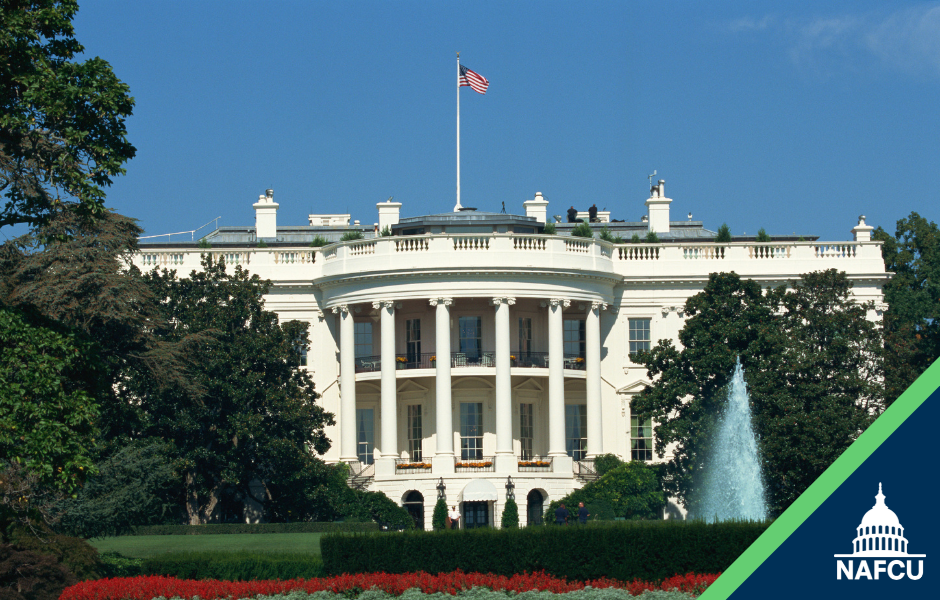Newsroom
POTUS unveils 2023 budget proposal, calls for increased CDFI, SBA, FinCEN funding
 President Joe Biden Monday released his fiscal year 2023 budget proposal, totaling more than $5.7 trillion, laying out spending plans to begin Oct. 1. In an official statement, the administration indicated that the budget request to Congress "sends a clear message that we value fiscal responsibility, safety and security at home and around the world, and the investments needed to continue our equitable growth and build a better America.”
President Joe Biden Monday released his fiscal year 2023 budget proposal, totaling more than $5.7 trillion, laying out spending plans to begin Oct. 1. In an official statement, the administration indicated that the budget request to Congress "sends a clear message that we value fiscal responsibility, safety and security at home and around the world, and the investments needed to continue our equitable growth and build a better America.”
Of note for credit unions, the proposal would boost funding for the Small Business Administration (SBA), the Community Development Financial Institution (CDFI) Fund, and the Department of Housing and Urban Development (HUD) compared to 2022 enacted levels.
CDFI Fund
The proposal provides $331 million to the Treasury's CDFI Fund – a 23 percent increase from fiscal year 2022. The CDFI funding is cited as supporting opportunities for minority-owned businesses, affordable housing development, and community revitalization projects.
NAFCU has consistently advocated for increased funding for the CDFI Fund as there are hundreds of CDFI-certified credit unions across the country that work to meet the needs of low-income, minority, and underserved communities. The association recently expressed support to Senate Banking’s Housing, Transportation, and Community Development Subcommittee Chairwoman Tina Smith, D-Minn., and Ranking Member Mike Rounds, R-S.D. for their introduction of the CDFI Bond Guarantee Program Improvement Act; legislation that aims to jumpstart economic development in economically distressed areas and address disparities in access to capital for underserved communities by strengthening and expanding CDFIs.
SBA
The President’s budget proposal increases the authorized lending levels in SBA’s flagship 7(a) loan guarantee program, the 504 loan program for fixed assets, Small Business Investment Companies, and the Secondary Market Guarantee program by a total of $9.5 billion. Increasing these lending levels could drive economic growth by significantly expanding the availability of working capital, fixed capital, and venture capital funding for small businesses.
FinCEN
Due to global conflict, specifically dealing with tensions between Russia and Ukraine, Biden's proposed budget includes $210 million for the Financial Crimes Enforcement Network (FinCEN) as the country continues to expand it sanctions against Russia and works to tighten cybersecurity. FinCEN recently issued an alert to credit unions about the potential of sanction evasion activity.
Housing
The Budget supports access to homeownership for underserved borrowers, including many first-time and minority homebuyers, through Federal Housing Administration (FHA) and Ginnie Mae credit guarantees. Via FHA and HOME, the budget also provides $115 million for complementary loan and down payment assistance pilot proposals to expand homeownership opportunities for first-generation and/or low-wealth first-time homebuyers.
NAFCU recently wrote a letter to HUD regarding its draft 2022-2026 strategic plan to recommend that the department create goals specific to assisting financial institutions that specialize in serving low- and moderate-income borrowers with otherwise limited access to personal and business financing.
In addition, the proposal requests $50 billion to boost the supply of housing, including $35 billion in funding for state and local housing finance agencies to provide grants and revolving loans to “reduce transactional costs and increase housing.” This money is part of a request to boost HUD’s overall budget by 34 percent, for a total of $71.9 billion in funding.
Explore the complete budget request here. NAFCU will continue to advocate for funding for agencies and programs that allow credit unions to meet members' needs and support their communities.
Share This
Related Resources
Add to Calendar 2024-06-26 14:00:00 2024-06-26 14:00:00 Gallagher Executive Compensation and Benefits Survey About the Webinar The webinar will share trends in executive pay increases, annual bonuses, and nonqualified benefit plans. Learn how to use the data charts as well as make this data actionable in order to improve your retention strategy. You’ll hear directly from the survey project manager on how to maximize the data points to gain a competitive edge in the market. Key findings on: Total compensation by asset size Nonqualified benefit plans Bonus targets and metrics Prerequisites Demographics Board expenses Watch On-Demand Web NAFCU digital@nafcu.org America/New_York public
Gallagher Executive Compensation and Benefits Survey
preferred partner
Gallagher
Webinar
Add to Calendar 2024-06-21 09:00:00 2024-06-21 09:00:00 The Evolving Role of the CISO in Credit Unions Listen On: Key Takeaways: [01:30] Being able to properly implement risk management decisions, especially in the cyber age we live in, is incredibly important so CISOs have a lot of challenges here. [02:27] Having a leader who can really communicate cyber risks and understand how ready that institution is to deal with cyber events is incredibly important. [05:36] We need to be talking about risk openly. We need to be documenting and really understanding what remediating risk looks like and how you do that strategically. [16:38] Governance, risk, compliance, and adherence to regulatory controls are all being looked at much more closely. You are also seeing other technology that is coming into the fold directly responsible for helping CISOs navigate those waters. [18:28] The reaction from the governing bodies is directly related to the needs of the position. They’re trying to help make sure that we are positioned in a way that gets us the most possibility of success, maturing our postures and protecting the institutions. Web NAFCU digital@nafcu.org America/New_York public
The Evolving Role of the CISO in Credit Unions
preferred partner
DefenseStorm
Podcast
AI in Action: Redefining Disaster Preparedness and Financial Security
Strategy
preferred partner
Allied Solutions
Blog Post
Get daily updates.
Subscribe to NAFCU today.
